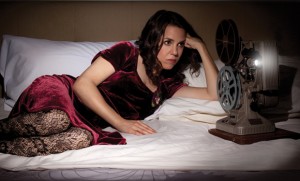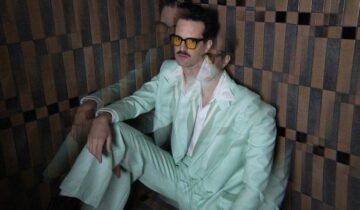 For the ECONOMIST: PETRA HADEN, an American musician, has earned attention for her sweet and somewhat cheeky a cappella covers of classic pop songs by The Who and Michael Jackson. By layering tracks of her vocal recordings, she is able to recreate the instrumentation on hits such as Journey’s “Don’t Stop Believin’”. In 2005 she even released a full cover of the album “The Who Sell Out”. Now she has turned her attention to film scores.
For the ECONOMIST: PETRA HADEN, an American musician, has earned attention for her sweet and somewhat cheeky a cappella covers of classic pop songs by The Who and Michael Jackson. By layering tracks of her vocal recordings, she is able to recreate the instrumentation on hits such as Journey’s “Don’t Stop Believin’”. In 2005 she even released a full cover of the album “The Who Sell Out”. Now she has turned her attention to film scores.
“Petra Goes to the Movies”, her new album, is full of tunes from classic films including “Psycho”, “Fistful of Dollars” and “Superman”. Her sound ranges from light and bouncy to dark and foreboding, but the effect is playful throughout. Recreating an orchestra’s-worth of sounds with just her voice, she conjures up the eeriness of “Taxi Driver” and the youthful sensitivity of “My Bodyguard”.
Ms Haden, who also plays the violin, grew up in a musical family. Her father, Charlie Haden, is a jazz bassist, and she still occasionally sings with her triplet sisters, Tanya and Rachel, also musicians. Since starting out as a solo artist in 1999, she has worked with bands such as The Decemberists and That Dog, and recorded with rockers including Beck, Foo Fighters and Green Day. She has also collaborated with Bill Frisell, a jazz guitarist.
Ms Haden talked to The Economist about re-interpreting film songs and her next project: making a country-music album with her sisters.
What makes film scores different from other music, and why are you drawn to them?
It’s the arrangements in film scores that I connect with most of all. What I like most is how it takes me to another world.
How and why did you choose these scores?
Most of the music I chose I’ve listened to many times throughout my life. So it was a given that “Superman” was the first to make the list. I like music to be challenging to sing, yet romantic and heroic. The music to “Cinema Paradiso” is so beautiful to me that it would get stuck in my head. So I had to record it. I like the repetitiveness and energy in “Psycho” and the craziness and spontaneity of “Carlotta’s Galop” [from the 1963 film “8 ½”].
Which tracks proved more difficult to sing than others?
“Carlotta’s Galop” was more difficult because I had to keep the pulse of the percussion sound steady throughout the piece, and it was a little hard to keep the rhythm in time. But after a few takes I got it. Also, the dissonant trumpet notes were hard to pick out.
Several of the films featured on the album, like “Taxi Driver” and “Cool hand Luke”, are about lone troubled men. Do these stories particularly appeal to you?
“Superman” is also similar to what you’re describing. I relate to the feeling of being an outsider; I also relate to sad movies. I like it when I cry during a movie. To me, “Superman” is an anchor to a lot of the characters in these movies—they are odd, different, isolated and alone. I’ve felt all of these things in my life at one time or another.
You have accomplished much with both the violin and your voice. Has singing helped your violin playing in any way, or vice versa?
When I record violin parts on a song, sometimes I come up with a part by singing it first and then record it on violin. Sometimes I can just improvise a part too. There have been times when I listen back to a song that I sang and played on, and my violin and voice sound so similar. My voice definitely helps me to think of ideas for string parts.
Some of your versions sound more exciting than the originals. What do you aim for when interpreting someone else’s music?
I want to maintain the beauty of the song while adding my own thing to it. I really don’t think too much about what not to do. I just do my best and sing.
Your next project is a Haden Triplets country-music album. How did that come together? Why country music?
When my siblings and I were kids we used to visit my Dad’s family in Missouri and sing old country songs in harmony together. I have great memories of that time. I enjoy singing those songs now because I love the stories—a lot of them are about love and heartache, or about how someone’s dog ran away. I like these kinds of stories because they’re simple and meaningful.
“Petra Goes to the Movies” is out now




[…] an outsider; I also relate to sad movies. I like it when I cry … … Visit link: Interview: Petra Haden | Blogowitz ← CMT : News : Tim McGraw Talks About "Nights" and Nashville (Part … […]